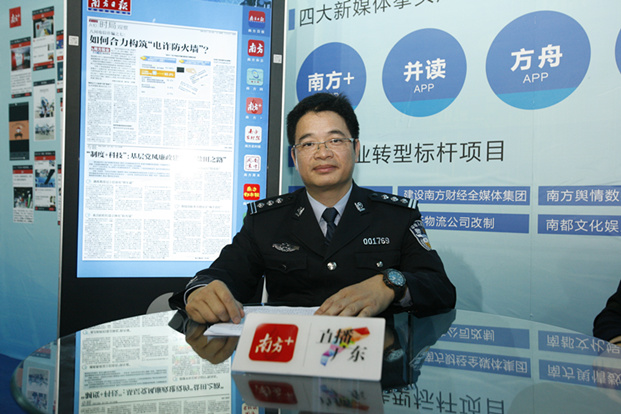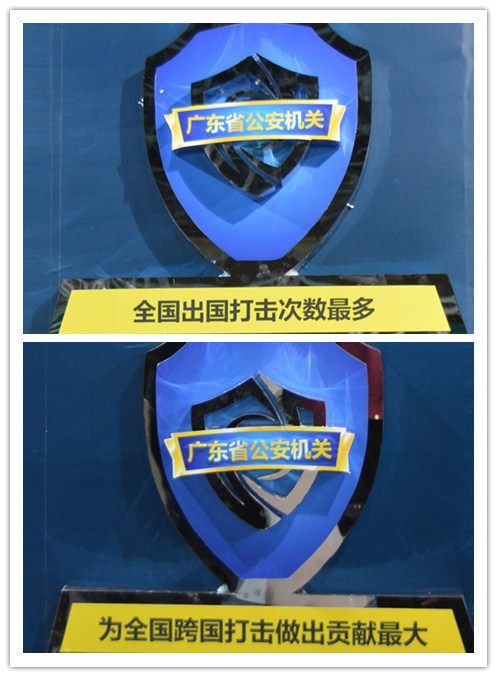In recent years, mobile vehicles' penetration into our life give rises to the increasing telecommunication frauds.
To fight the increase in telecom fraud, Guangdong police established the Guangdong Center for Combating Telecommunication Fraud and Cyber Crime in September 2016, and launched a series of special operations.
Ruan Fucheng, Deputy Director of the Key Criminal Case Section under Guangdong's Provincial Department of Public Security.
So, how does telecom fraud develop? What are the characteristics of telecom fraud? How to recognize it? Recently, Ruan Fucheng, Deputy Director of the Key Criminal Case Section under Guangdong's Provincial Department of Public Security was invited to have a talk on telecom fraud.
Strong anti-crime actions to fight against new fraud practices
According to Ruan Fucheng, telecommunication fraud is originated from Chinese Taiwan and was brought to Chinese mainland last century. It is learned that now there are 48 different kinds of telecommunication fraud via different communication channels, such as Phone call, QQ, WeChat,etc..
Ruan Fucheng is introducing telecom frauds.
There are three characteristic of telecom fraud. The first is, cross-nation. According to Ruan, some overseas telecom fraud gangs have moved their hideouts from Southeast Asia to Europe, Africa. The second is “accurate” fraud, a product of the big data technology. The final one is regionality. For example, Dianbai District of Maoming, Mei Xian District of Meizhou have been found the sources of telecom frauds.
Since the establishment of the Guangdong Center for Combating Telecommunication Fraud and Cyber Crime, Guangdong police has saved 8839 citizens out of telecom fraud pitfalls and avoided loss of 240,000,000 yuan. 6538 bank cards involved in crime, which is worth 136,000,000 yuan, have been stopped.
Domestic and overseas crackdowns on telecom frauds
In 2016, Guangdong police has launched 7 cross-national crackdowns on telecom frauds in Southeast Asia, Europe and Africa. 296 suspects have been detained. “Guangdong police tops in the country in the amount of overseas crackdowns,” Ruan said.
In the domestic battlefield, Guangdong police has organized 5 crackdowns, capturing 1300 suspects and freezing capital of 300,000,000 yuan.
Besides, as to address telecom fraud from its root cause, citizens’ privacy leak, Guangdong police has captured 829 suspects involved in privacy buy and found 340,000,000 pieces of personal information leaked, stolen and bought.
Guangdong police tops in the country in the amount of overseas crackdowns.
How to avoid telecom fraud?
According to Guangdong police, people should remember 3 “hand up”, 2 “don’t” and 9 “don’t trust”. They are:
3 “hand up”, 2 “don’t”
1.When someone mention bank card on the phone, hand up quickly.
2.When someone say you win a prize, hand up quickly.
3.When someone say they are civil servants and require you to make remittance, hand up quickly.
4.Don’t click any links in messages and delete them quickly.
5.Don’t click any links sent by strangers on WeChat.
6.It must be fraud if someone mention “safe account”.
Remember 9 “don’t trust”
1.If someone say they are civil servants and require you to make remittance, don’t trust.
2.If someone require you to make remittance to “safe account”, don’t trust.
3.If someone say you win a prize, don’t trust.
4.If someone require you to make payment before accepting prize, don’t trust.
5.If someone tell you your families meet an accident and require you to make remittance, don’t trust.
6.If someone ask information of your bank card and PIN, don’t trust.
7.If someone say they are your boss and require you to make remittance, don’t trust.
8.If someone require a personal inspection before opening an online banking, don’t trust.
9.If websites require you to register banking information, don’t trust.
By Steven & Abby




















